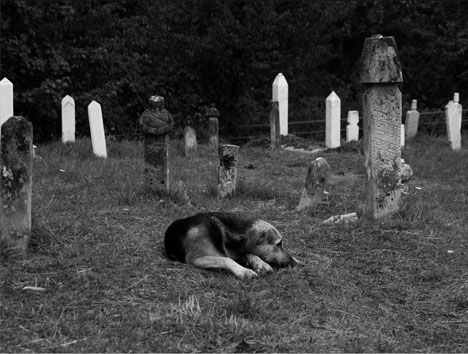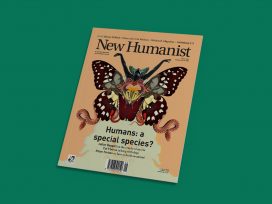The number of stray dogs in Sarajevo has recently surpassed 11,000, according to Bosnian media reports. The strays are said to be a significant nuisance, attacking people and a possible source of infectious diseases in the capital of Bosnia and Herzegovina, with its 300,000 inhabitants.

Photo: jah poupoune. Source:Flickr
Last October, during a visit from the British animal welfare organization Dogs Trust that provided assistance in the form of funds for the mass castration of strays, British ambassador to Bosnia Nigel Casey said: “Dogs are more important than politics.”
And indeed, the Bosnian example demonstrates that dogs and politics are tied together. In the war of 1992-1995, not only people, but many dogs were displaced and abandoned, left to their own devices. But in 2009, the authorities passed a law obliging local communities to build asylums and castrate stray animals. Many smaller towns did just that, but funds were insufficient to realize such initiatives in Sarajevo. In response to which, the UK charity RSPCA, Dog Trust and the EU all offered financial assistance. But the mayor, himself a veterinary physician, declined the offers. Why? Because killing dogs is more profitable than catching, castrating and releasing them. Not to mention that some 700,000 pounds allocated by the EU for the castration and putting down of strays mysteriously disappeared…
Two years ago, the young Bosnian film director Damir Janecek made a documentary film entitled Kinofil, revealing how money is made out of killing strays. Among others, activists from SOS Bosnia (an association for the prevention of cruelty towards animals) speak in the film about the torture and mass killing of dogs in Sarajevo, and about their own ordeal at the hands of people involved, who receive a reward for each dead dog. A former pound worker relates how dogs are beaten to death or have chlorine injected directly into their hearts. Dogs are also killed in the streets – with guns, poison and baseball bats. It seems that anything is permitted and that there are more than enough people – children included – willing to do the job.
Since its screening at Sarajevo Film Festival in 2010, the film has been boycotted in Bosnia and Herzegovina. The director, as well as the founder of SOS Bosnia, were forced to leave the country after serious threats and attacks.
What kind of people torture dogs, and allow their kids do the same? What kind of society allows such people to get away with such acts scot-free, while witnesses to their criminal behaviour are forced to leave the country?
The fate of the dogs can’t be separated from the fate of the people. Less than twenty years after the end of the war in Bosnia and Herzegovina, and the Dayton agreement, memories of suffering are still very much alive – as well as the feeling that human life is not worth a penny. If a human life is worthless, how could any value be attached to a dog’s? However, this does not explain the torturing and the brutality – that is, the lack of humanity and the surplus of violence among Sarajevans. Yes, poverty, powerlessness and the feeling of having no future contributes to their barbarism, but the question remains: why have so many citizens, even children, become indifferent to brutality towards dogs, and to such an extent that one could even call it pathological?
The answer lies not only in the domain of individual psychology, or mass psychology – according to which former victims often become perpetrators – but also in the fact that society does not recognize culprits in the perpetrators and does not administer punishment because the victims happen to be animals. In the absence of punishment, guilt spreads a kind of infection that is more dangerous than any infection the dogs are said to carry – it creates indifference and leads to the dehumanization of society. The worst thing that could happen to a victim is for him or her to become a perpetrator, thus completing the vicious circle and confirming that we are all the same.
The documentary Kinofil tells a story about a society where such a transformation is taking place. It also points to corruption and the absence of the rule of law as a basis for the cruelties. The fate of these dogs appears to be a suitable metaphor for the state of Bosnia and Herzegovina: if the state apparatus doesn’t function on the level of dogs, it can’t function on the level of people either. Ignoring the law creates conditions in which inhuman behaviour goes unpunished and, therefore, becomes habitual. The attitude towards the dogs reflects the attitude towards all who are weak, defenceless, different.
It is predictable that many will react to this concern for dogs by saying that the state’s primary concern is for its citizens, to prevent insecurity, poverty, hunger, lack of hygiene, that is, “a dog’s life”. But the argument is flawed, simply because caring about people does not exclude caring about animals.
This week, the Bosnian Parliament, acting on a social-democratic proposal, will take a final vote on changes to the law on animal protection. If passed, the changes will enable the state to eliminate stray dogs after 15 days; before that they have a chance to be adopted or helped by animal advocate organizations such as “AWA Bosnia”. It means making canocide legal, plain and simple. This law should not be allowed to pass.
Nigel Casey’s words that dogs are more important than politics, are ominous. Unfortunately, the solution to this perfectly solvable problem of stray dogs in Bosnia is now an issue for – politics.






